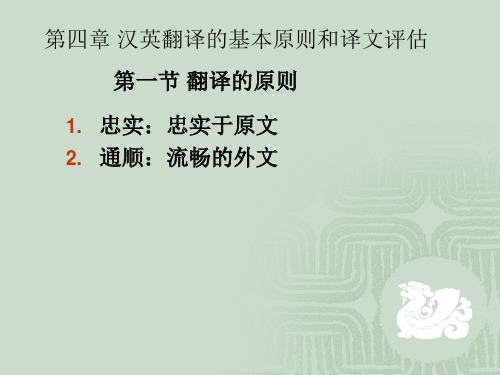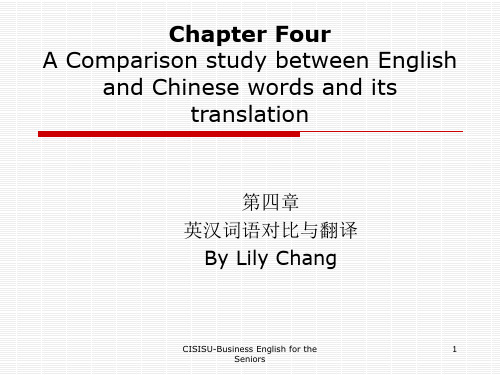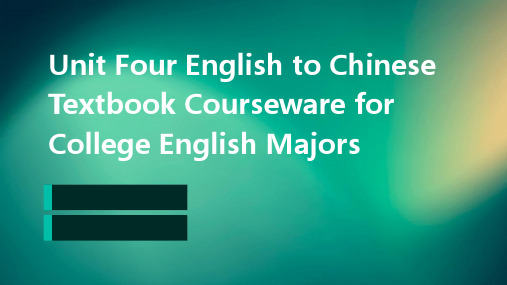英汉翻译基础教程 第四单元 句法翻译-ppt
第四章 汉译英的标准及译文

例2. 你们谁想参加春游就在星期五之前报名并交费。 原译:You whoever wants to go spring outing please sign up your name and pay dues before Friday.
译文1:Whoever wants to join the spring outing should sign up and pay the expenses before Friday. 译文2:Those of you who want to go on the spring outing are required to sign up and hand in the payment before Friday. 译文3:If any of you wants to take part in the spring outing, please sign up and pay for it before Friday.
例2. 在战争期间,他私藏了许多珍贵的物品。
In wartime, he accumulated many scarce items. 改译: In wartime, he hoarded many scarce items.
例3I am deeply grieved to hear that your mother kicked the bucket. 改译: I am deeply grieved to hear of your mother’s death.
那男孩大约八九岁。 例6.那男孩大约八九岁。 那男孩大约八九岁
译文: 译文: The boy was about eight or nine years old. 改译: 改译:The boy was eight or nine years old. 他一两个星期后来。 例7.他一两个星期后来。 他一两个星期后来 译文: 译文:He will come after a week or two. 改译: 改译:He will come in a week or two.
穆雷《英汉翻译基础教程》配套题库含考研真题(篇章翻译)【圣才出品】

第4章篇章翻译4.1 语篇衔接⊙指称衔接Ⅰ.人称照应1. You must remember, my dear mother that I have never considered this matter as certain. I have had my doubts, I confess; but they are fainter than they were, and they may soon be entirely done away...【译文】您应该记住,我的好妈妈,我从来没有把事情看得一定如此。
我承认我有疑虑,但是不像以前那么重了,也许很快就会彻底打消……2. In addition English is the language of commerce and the second language of many countries which formerly had French or German in that position.【译文】此外,英语还是贸易语言,并取代了原来法语和德语的位置而成为许多国家的第二语言。
【解析】译文明确了照应对象,保留了英文中的照应方式。
3. Credit cards enable their holders to obtain goods and services on credit. They are issued by retail stores, banks, credit card companies to approved clients. The bank or credit card company settles the client’s bills, invoicing him monthly andcharging interest on any outstanding debts. Their profits come from the high rate of interest charged, the card-holder’s subscriptions, and the fees paid by some organizations that accept cards.【译文】信用卡能使持卡人通过赊账的方式购买商品,得到服务。
chapter four-商务英语英汉翻译教程PPT精品文档53页

CISISU-Business English for the
8
Seniors
Part 1. Relationship between the meaning of English and Chinese words
3. no correspondence 词义缺乏对应
Plumber
形成于“五角大楼文件”泄密事件后白宫设 立的专门特工机构。Plumber原意“铅管 工”,用以指特工,系借用“铅管工”堵漏、 防漏之含义)美国调查政府雇员泄密事件的 特工(《参考消息》将此词翻译为“管子 工”)
Chapter Four A Comparison study between English
and Chinese words and its translation
第四章 英汉词语对比与翻译
By Lily Chang
CISISU-Business English for the
1
Seniors
Targets of Chapter Four
CISISU-Business English for the
3
Seniors
Part 1. Relationship between the meaning of English and Chinese words
Differences: Chinese-相比英文,汉语词义严谨固定,
词的含义范围较窄,词义上下的依赖性比较 小。
译文:为应对目前的“非洲之角”饥荒,中国政府 决定通过联合国双边渠道向有关国家提供价值 4.432亿元人民币的紧急粮食援助。
CISISU-Business English for the
5
大学英语专业英翻中教材课件unitfour

Ensure that the topic has discussion value, can stimulate students' thinking and expression of opinions, and requires accurate language and rich content.
Exhibition and Review of Student Works
01
Work Exhibition
Regularly organize student work exhibitions to showcase excellent compositions and stimulate their writing confidence and sense of honor.
Interactive communication
Encourage students to evaluate and communicate with each other, grow together through interactive learning, and cultivate their critical thinking and evaluation abilities.
The present perfect tense
This unit focuses on the use of the present perfect tense, its formation, and its various uses, such as expressing an action that started in the past and is related to the present
英汉句子互译词序PPT课件

复合句的词序翻译
总结词
复合句的词序翻译需要特别注意,因为英语和汉语在处理从句和修饰语时的语序 存在较大差异。
详细描述
在复合句中,通常先翻译主句,然后再翻译从句或修饰语。例如,“I like the book that you recommended”应该翻译为“我喜欢你推荐的那本书”,而不是 “我喜欢你推荐的书的书”。
特殊句型的词序翻译
总结词
特殊句型的词序翻译需要结合具体的句型和表达习惯进行处理。
详细描述
一些特殊句型如倒装句、强调句、省略句等在英语中语序与常规句型不同,翻译时需根据中文的表达习惯进行相 应的调整。例如,“Only then did he realize the importance of English”可以翻译为“直到那时他才意识到 英语的重要性”。
在时间状语、地点状语和方式状语的排列顺序上,英汉也存在明显的差异。
PART 02
英语句子词序翻译为汉语
简单句的词序翻译
总结词
简单句的词序翻译相对简单,主要遵循中文的基本句法规则和表达习惯。
详细描述
在简单句中,英语和汉语的词序基本一致,因此翻译时只需按照中文的表达习 惯调整语序,确保语义清晰、通顺。例如,“He is a teacher”可以翻译为“ 他是一名教师”。
PART 01
英汉句子词序概述
英语句子词序特点
英语句子通常采用主语-谓语-宾 语的线性结构,谓语位于句子的
核心位置。
修饰成分如定语和状语通常紧跟 在谓语之后,位于宾语之前。
英语句子中时间状语、地点状语 和方式状语的排列顺序通常为: 时间状语-地点状语-方式状语。
汉语句子词序特点
汉语句子结构较为灵活,主语、 谓语、宾语的顺序没有固定的 规则。
英汉翻译之四PPT课件

Chinese
cause → effect
conclusion → analysis analysis → conclusion
hypothesis → premise premise → hypothesis
a
5
12. At 6:30 p.m., December 6, 1973, Gerald Rudolph Ford, raised his right hand in the U.S. House of Representatives, where he had spent 25 years working toward but never getting the top office of Speaker, and became Vice President of the U.S. 1973年12月6日下午6点30分,杰拉德`伦道夫`福特在美 国众议院中举起了右手,成为美国的副总统。他在众议 院中曾度过25个年头,并一直在争取充当议长,但始终 未能如愿。
为了表达的顺畅; 为了突出主要(primaHe foolishly answered the question. 1b. He answered the question foolishly. 2a. I, too, have been to Paris. 2b. I’ve been to Paris, too. 3a. They failed to trust the matter to a responsible person. 3b. The man responsible was at last punished.
and fire stations.
目前在许多国家有线电视可提供几十个频道的节目,不
lecture 4 英汉互译教程.ppt
The isolation of the rural world because of distance and the lack of transport facilities is compounded by the paucity of the information media.
她已试了好几次,要帮他们另找一所出租的 房子,结果并未成功。
7. He wanted to tell John how surprised he was at his knowledge but embarrassment made him hold his peace.
他想告诉约翰,他没有料到他的知识这么渊 博,但是觉得有些不好意思,没有说出口。
门口放了一堆雨伞,少说也有十二把,五颜 六色,大小不一。
2)There are many wonderful stories to tell about the places I visited and the people I met.
我访问了一些地方,遇到了一些人。要谈起 来,奇妙的事可多着哩。
2). 原来悟空手疾眼快,正在那混乱之时, 他拔下一根毫毛,叫声“变!”就变成他的 本相。
As Sun Wukong was deft of hand and quick of eye, he plucked one of hairs from his body in the midst of the fray and shouted “Change!” It changed into his own double.
5.Sometimes Mrs. Cross would be walking around in the big kitchen watching him eat.
英汉翻译教程讲解第四章
第4章Unit 4 Economy1. 经济文章选篇。
其特点是:着重说明经济形势,提出主张和建议,以大量数据说明问题。
所用语言视场合而定,文件的语言正式而精练,演讲的语言则要比较易于上口。
2. 语言对比:(1)经济术语。
经济领域有大量的专门术语。
如:two way trade双向贸易l ucrative export markets 获利的出口市场foreign exchange 外汇commercial opportunities商业机会export opportunities 出口机会potential exports潜在市场(2)有些普通词语在经济文章中有特殊含义。
经济术语有特殊的用法和搭配。
例1)The result, I believe, is that we have built the beginnings of a sound foundation for future commercial and financial ties.我相信我们已经为今后贸易与金融关系初步打下了坚实的基础。
例2)There are more than 20 joint ventures between the US and Chinese investors.现在有20多家中美合资企业。
(3)数字及有关的术语和量词。
数字很容易出错,因此要特别仔细核对。
和数字有关的动词、介词、形容词、副词也很重要。
如“增加了”和“增加”表示的意思是不一样的。
by用来表示增加或减少的幅度。
表示倍数时汉语与英语不一样。
汉语:1)甲比乙...(形容词或副词)n倍:不包括基数。
2)甲是乙n倍:包括基数。
英语:1) "n+ times + adj.比较级+than"式:包括基数;2) "n+ times + as + adj. + as"式:包括基数;3) "verb (e.g. increase, grow, rise, be raised, etc.) + n + times"式:包括基数。
《英汉翻译教程》课件
02 英汉语言对比
词汇对比
总结词
词汇是语言的基础,英汉两种语言在词汇方面存在许多差异。
详细描述
英语中一词多义现象较为普遍,而汉语中一词多义现象相对较少。此外,英语 中常用抽象名词表达具体概念,而汉语中则常用具体名词表达抽象概念。
句法对比
总结词
英汉两种语言的句法结构也存在显著差异。
详细描述
英语句子结构较为严谨,主语、谓语、宾语等成分的位置相对固定,而汉语句子结构则较为灵活,主 语、谓语、宾语等成分的位置可以灵活变化。此外,英语中常用被动语态,而汉语中则常用主动语态 。
翻译的标准与原则
翻译的标准
准确、流畅、专业。准确是指译文要忠实于原文,不歪曲、不遗漏;流畅是指译 文要通顺易懂,符合目标语言的表达习惯;专业是指译文要符合特定领域的专业 要求,确保信息的准确传达。
翻译的原则
忠实、通顺、一致。忠实是指译文要忠实于原文的内容和风格,保持原作的思想 和风格特点;通顺是指译文要通顺易懂,避免出现语法错误和表达不清的情况; 一致是指译文要保持前后一致,避免出现信息不一致的情况。
详细描述
由于英汉文化背景的差异,某些表达方式在英语中常 见,但在汉语中却不太适用。如果在翻译时忽略了这 种差异,会导致译文出现语用错误。例如,“It’s raining cats and dogs”被直译为“下猫下狗”,实 际上在汉语中应翻译为“倾盆大雨”。
语用错误分析
总结词
语气和风格不匹配
详细描述
科技翻译技巧
科技翻译中需要注意专业术语的准确 翻译,同时要保持原文的语义和风格 。
科技翻译实践
选取一些典型的科技文献进行翻译练 习,让学生在实际操作中掌握科技翻 译的技巧。
感谢您的观看
新编汉英翻译教程--第四章(Shortened)PPT课件
语,下笔便译,结果译文虽然在形式上可能与原 文相似,意义却相去甚远,行文也生硬,不符合 英语的表达习惯。在翻译实践中,我们应根据英 美人的思维方式、语言习惯、语境和行文需要, 对主语的确定加以考虑。如果保留原主语的做法 不妥,我们就要另觅他法了。
2021/6/7
⑵起大风了。
2I0t2's1/6/b7 lowing hard.
11
4.2 谓语的确定与主谓一致问题
2021/6/7
12
汉语句子中谓语成分五花八门,非常复杂,而英 语句子中的谓语比较单一,只能由动词或动词短语 承担。
汉译英时,有时可以选择与原文对应的谓语,但 多数情况下,往往既不能照搬原文的主语,也不能 照搬原文谓语,而须作调整,或新觅谓语。谓语的 选择与主语密切相关。从思维步骤来看,主、谓语 的确定互为因果。译者根据语义传达和行文构句的 需要,在确定译文主语的时候,也在考虑谓语动词 的选择,或者反过来,译者可能先想好了谓语动词, 再来选择主语。
⑶句与句之间无明示逻辑关系的连接词。
所以汉语句子看似松散,如流水般无定法可依。
2021/6/7
2
英语为语法型语言,重点研究主谓序列及其相关 词类,句子结构受形式制约,注重形式的严谨。
因此英语的句法特征是:
⑴主语突出﹑易于识别,且只能由名词或名词性的词语、数 词、代词等少数词类担任;
⑵谓语绝对受主语的支配,在人称和数上必须和主语保持一 致,有时态语态和语气的变化;
⑶句与句之间多以明示逻辑关系的连接词相连。
所以英语依法构句,形式完整而严密。 在汉英翻译中,记住英语是主语显著语言,英语句子建筑 在主谓轴上。因此选择确定主谓语,是成功构句、保证译文 与原文功能相似语义相符的关键。
- 1、下载文档前请自行甄别文档内容的完整性,平台不提供额外的编辑、内容补充、找答案等附加服务。
- 2、"仅部分预览"的文档,不可在线预览部分如存在完整性等问题,可反馈申请退款(可完整预览的文档不适用该条件!)。
- 3、如文档侵犯您的权益,请联系客服反馈,我们会尽快为您处理(人工客服工作时间:9:00-18:30)。
六、转态译法
所谓转态译法,就是在翻译过程中把原文中的被 动语态转换为译文中的主动语态,或把原文中的 主动语态转换成译文中的被动语态。一般情况下, 无论是书面语,还是口头语中,英语比汉语用更 多的被动语态。 1. New Zealand had no knowledge of this and had not been consulted on these reported plans. 新西兰不知道这件事,也没人同它商讨过这些传 闻的计划。
第四单元
句子翻译
一、换序译法
翻译时根据译文的语言习惯,对原文的词序进行 调整,使译文做到最大程度上的通顺,这就是换 序译法。 1. It’s good you are so considerate. 你想得这样周到是很好的。 (×这是很好的你想得这样周到。)(主语从句 语序)
一、换序译法
三、转句译法
他感到习语是语言的支柱,因此特别主张用生动 的短语,他的想法是非常正确的。 (定语转句)
4. I tried vainly to put the pieces together. (Helen Keller: The Story of My Life) 我想把这些碎片拼在一起,可是拼不起来。 (状语转句)
二、断句译法
把一些长句断开来翻译就叫断句译法。 1. It is very easy to bring some books from the bookstores and libraries, but to learn the knowledge in the books and put the knowledge into practice is by no means an easy job. 从书店和图书馆带一些书回来是轻而易举的。// 然而,从书中学得知识并把这些知识运用到实践 中去就决不是那么简单的事情。 (拆开并例句)
五、缩句译法
4.黛玉又忙倒茶,一面又使眼色与宝玉。宝玉会 意,便走了出来。(曹雪芹:《红楼梦》,第五 十二回) Daiyu ordered tea, glancing at Baoyu as she did so. Taking the hint, he went out of the room. (缩为状语)
2. Formerly a worker himself, he was now an engineer. 他过去是工人,现在当了个工程师了。 (×这是很好的你想得这样周到。) (同位语从句换序) 3. Cheerful, efficient and warm-hearted, they will do everything to make your journey smooth and comfortable.
一、换序译法
9. He witnessed ①the sixth ②post-war ③economic crisis ④of serious consequence ⑤that prevailed in various fields ⑥in the USA. 他亲眼目睹了⑥美国②战后①第六次④后果严重 的⑤波及各领域的③经济危机。 (英语原文定语的词序:①次第定语、 ②时间定语、 ③本质性定语、中心词、 ④判断性定语、 ⑤陈述 性定语、 ⑥国别定语; 汉语译文定语的词序:⑥国别定语、②时间定语、 ①次第定语、④判断性定语、⑤陈述性定语、③ 本质性定语、中心词)
一、换序译法
(×从来没有以前我们国家……) (倒装句换序) 5. 发生了这样的事不是你的错。 It is not your fault that this has happened. (×That this has happened is not your fault. ) (这样翻译过于正规,在文体上与原文不符。) (主语从句换序)
三、转句译法
5. “It’s very bad, madam, obviously.” (Herman Wouk: The Winds of War) “情况很不好,夫人,这是很明显的。” (插入语转句)
四、合句译法
一般来说,英语句子要比汉语句子长,一个英语 句子要比一个汉语句子具有更大的容量。因此, 我们在汉译英时有必要、也有可能把两个或者两 个以上的汉语句子翻译成一个英语句子。比较口 语化的英语句子也比较短,我们在英译汉使也经 常要用合句译法,把两个或者两个以上的英语句 子翻译成一个汉语句子。这就是合句译法。
一、换序译法
She teaches us French every morning. (×She every morning teaches us French.) (状语换序)
8.会议没能取得一致意见就结束了。 The meeting ended in disagreement. (×The meeting didn’t achieve agreement and ended.) (状语换序)
六、转态译法
2. It was reported that Yugoslavian President Tito told a Soviet envoy to “go to hell”. 据报道,南斯拉夫总统铁托叫一位苏联使者“别 胡诌”。 3. The visitor was flattered and impressed. 这位客人受宠若惊,深为感动。
一、换序译法
他们乐观、能干、热情,总是想方设法使你一路 上顺利舒适。 (×乐观、能干、热情,他们总是想方设法使你 一路上顺利舒适。) (状语换序) 4. Never before has our country been as united as it is today. 今天,我们国家空前团结。
二、断句译法
(拆开名词从句) 4. Just then the fish gave a sudden lurch that pulled the old man down onto the bow. (Ernest Hemingway: The Old Man and the Sea)
Hale Waihona Puke 三、转句译法
2. After an hour, the trail took them by a low, spreading tree strung thickly with beads. (Alex Haley:Roots) 走了一个时辰光景,他们走到了一颗矮矮的枝繁 叶茂的树旁,树上密密麻麻地挂满了念珠。 (定语转句) 3. He had a sound feeling that idiom was the backbone of a language and he was all for the racy phrases.
五、缩句译法
2. She went back home to take care of her husband. He was seriously ill. 她回家去照料病重的丈夫。 (缩为定语) 3. Her father became the mayor of the city. He was a murderer in the Second World War. 她的父亲,二次大战中的一个杀人凶手,竟当上 了这个城市的市长。(缩为同位语)
六、转态译法
4. The secretary was aware that final decisions must be held open for the president. 国务卿心中有数,最后的决定必须由总统来做。
正在这当儿,那条大鱼突然把船扯得晃荡了一下, //老头儿给拖得倒向船头那边去。 (拆开定语从句) 5. After singing a concert in this city, he said he wanted to greet his admirers backstage as he always does.
四、合句译法
1.Darkness fell. // An explosion shook the earth. // It did not shake his will to go to the front. 夜幕降落时,一声爆炸震动了大地,可并没有动 摇他上前线的决心。 2. She is very busy at home. // She has to take care of the children and do the kitchen work. 她在家很忙,又要看好孩子,又要下厨。
四、合句译法
3. 袭人之母也早迎了出来。// 袭人拉了宝玉进去。 (曹雪芹: 《红楼梦》,第十九回) By now Xiren’s mother had come out to greet him too, and Xiren led Baoyu in. 4. 笛声止了。//远远地起了拍掌声和欢笑声。 (巴金:《家》) The flute stopped, and in the distance there was applause and laughter.
五、缩句译法
所谓缩句译法,就是根据原文的逻辑关系和译文 的语言习惯,把原文中的一个句子紧缩成译文中 的另一个句子的组成部分。一般情况下,我们把 原文上下文相对次要的句子紧缩成相对主要的句 子的组成部分,大多紧缩成状语,也有一部分紧 缩成定语或同位语乃至主语。 1. It was April 1945. The Second World War was coming to an end. 1945年4月,第二次世界大战已接近尾声。 (缩为状语)
